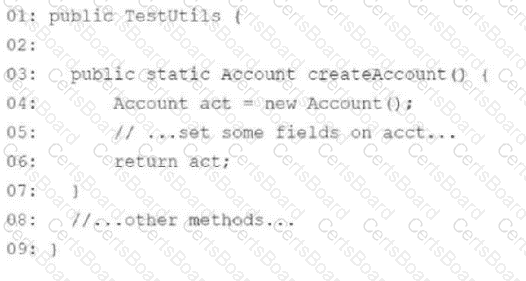Comprehensive and Detailed Explanation From Exact Extract:
To determine the correct implementation of the CheckPaymentProcessor class that adheres to the PaymentProcessor interface, we need to evaluate each option based on Apex syntax for interfaces, class implementation, and method overriding. Let’s analyze the problem and each option systematically, referencing Salesforce’s official Apex Developer Guide.
Understanding Interfaces in Apex:
Interface Definition: An interface in Apex defines a contract of methods that must be implemented by any class that implements the interface. The PaymentProcessor interface declares a single method: void pay(Decimal amount);. The Apex Developer Guide states: “An interface is a collection of method signatures that a class can implement, requiring the class to provide concrete implementations for each method” (Salesforce Apex Developer Guide, Interfaces).
Implementing an Interface: A class implements an interface using the implements keyword, and it must provide a concrete implementation (method body) for each method defined in the interface. The Apex Developer Guide notes: “A class that implements an interface must implement all the methods declared in the interface, with matching signatures” (Salesforce Apex Developer Guide, Interfaces).
Key Points:
Interfaces are implemented using implements, not extends.
The implemented methods must match the interface’s method signature (name, return type, parameters) and provide a method body.
Interfaces cannot be extended using extends because they are not classes; extends is used for class inheritance.
Requirement Analysis:
Interface: PaymentProcessor defines one method: void pay(Decimal amount);.
Class: CheckPaymentProcessor must implement this interface to provide check processing payment capabilities, meaning it must define the pay method with a matching signature and a concrete implementation.
Correct Implementation: The class must use implements PaymentProcessor and provide a concrete pay method with a body.
Evaluating the Options:
apex
Copy
public class CheckPaymentProcessor implements PaymentProcessor {
public void pay(Decimal amount) {}
}
Syntax: Uses implements PaymentProcessor, which is correct for implementing an interface in Apex.
Method Implementation: Defines public void pay(Decimal amount) {}, which matches the interface’s method signature (void pay(Decimal amount)) and provides a concrete implementation (empty body, but still valid). The Apex Developer Guide confirms: “The implementing class must provide a method body for each interface method, even if it’s empty” (Salesforce Apex Developer Guide, Interfaces).
Access Modifier: The pay method is public, which is required because interface methods are implicitly public, and the implementing method must have the same or less restrictive visibility.
Conclusion: Correct, as it properly implements the PaymentProcessor interface with a concrete pay method.
B.
apex
Copy
public class CheckPaymentProcessor implements PaymentProcessor {
public void pay(Decimal amount);
}
Syntax: Uses implements PaymentProcessor, which is correct.
Method Implementation: Declares public void pay(Decimal amount); with a semicolon instead of a method body (curly braces {}). In Apex, a method declaration without a body (ending in a semicolon) is valid in an interface or abstract class, but in a concrete class implementing an interface, it must provide a method body. The Apex Developer Guide states: “A class implementing an interface must provide a concrete implementation for each method, or the class must be declared abstract” (Salesforce Apex Developer Guide, Interfaces). Since CheckPaymentProcessor is not abstract, this results in a compilation error: “Method does not override any method from its superclass or interfaces.”
Conclusion: Incorrect, as it fails to provide a concrete implementation of the pay method, causing a compilation error.
C.
apex
Copy
public class CheckPaymentProcessor extends PaymentProcessor {
public void pay(Decimal amount);
}
Syntax: Uses extends PaymentProcessor, which is incorrect. In Apex, extends is used for class inheritance, not for implementing interfaces. The PaymentProcessor is an interface, not a class, so it cannot be extended using extends. The Apex Developer Guide clarifies: “Use implements to implement an interface; extends is used for class inheritance” (Salesforce Apex Developer Guide, Interfaces). This results in a compilation error: “Interfaces cannot be extended using extends.”
Method Implementation: Even if the syntax were correct, the pay method lacks a body (ends with a semicolon), causing the same issue as option B.
Conclusion: Incorrect due to the invalid use of extends for an interface and the lack of a method body.
D.
apex
Copy
public class CheckPaymentProcessor extends PaymentProcessor {
public void pay(Decimal amount) {}
}
Syntax: Uses extends PaymentProcessor, which, as noted in option C, is incorrect for an interface. The correct keyword is implements, not extends, leading to a compilation error.
Method Implementation: Provides a concrete pay method, which is correct in form, but the class declaration error makes the entire implementation invalid.
Conclusion: Incorrect due to the invalid use of extends for an interface, despite the correct method implementation.
Why Option A is Correct:
Option A is correct because:
It uses implements PaymentProcessor to properly declare that CheckPaymentProcessor implements the PaymentProcessor interface.
It provides a concrete implementation of the pay method (public void pay(Decimal amount) {}), matching the interface’s method signature and fulfilling the contract.
The public access modifier aligns with the implicit public visibility of interface methods.
This implementation adheres to Apex best practices for interfaces as outlined in the Salesforce Apex Developer Guide.
Example for Clarity:
Here’s the complete correct implementation (option A) with a sample method body:
apex
Copy
public interface PaymentProcessor {
void pay(Decimal amount);
}
public class CheckPaymentProcessor implements PaymentProcessor {
public void pay(Decimal amount) {
// Example implementation for check processing
System.debug('Processing check payment of amount: ' + amount);
// Add logic to process a check payment
}
}
The CheckPaymentProcessor class implements the PaymentProcessor interface and provides a concrete pay method, satisfying the interface’s contract.
This class can now be used wherever a PaymentProcessor is required, such as in a payment processing system.
Handling Typos:
The question’s code snippet and options are syntactically correct, with no typos to address.
The interface and class names are consistent throughout the question.
[References:, Salesforce Apex Developer Guide: , “Interfaces” section: Explains how to define and implement interfaces using the implements keyword, and the requirement for concrete method implementations., “Classes” section: Clarifies the difference between extends (for class inheritance) and implements (for interfaces).(Available at: https://developer.salesforce.com/docs/atlas.en-us.apexcode.meta/apexcode/), Platform Developer I Study Guide: , Section on “Developer Fundamentals”: Covers Apex object-oriented programming concepts, including interfaces and their implementation.(Available at: https://trailhead.salesforce.com/en/content/learn/modules/platform-developer-i-certification-study-guide), , , ]




